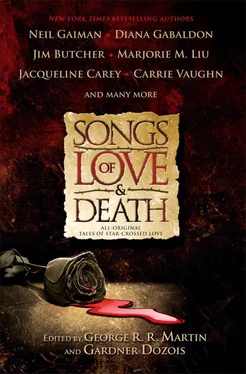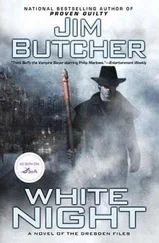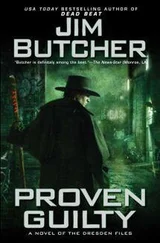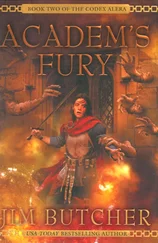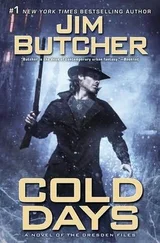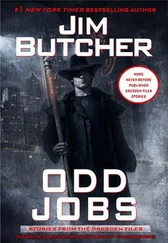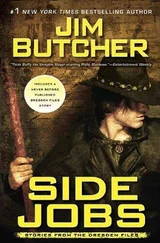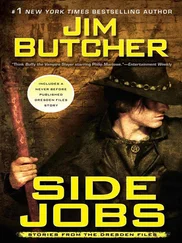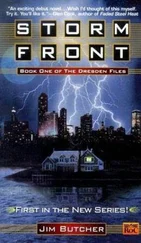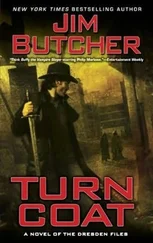The two gunmen pointed their weapons and yelled, “Freeze!” which nobody did. Instead people screamed and tumbled out of the way, covering their heads, falling to the floor, scrambling on top of each other. It was a pretty good strategy, because if they stayed in a mob and the gunmen fired, it would probably be somebody else who got shot.
Astonished, Charlotte just kept sitting there, back to the railing, instead of fleeing with the others. So one of the guys grabbed her, arm around her throat, and held her against the rail, purple parabolic dish to her temple.
Her captor shouted the obligatory “Nobody move!” She thought the other gunman was standing at the top of the stairs, pointing his weapon at the oncoming cops, preventing rescue. So much for a nice evening out.
Staring back at the gun, which had become very large in her vision, she wondered if the weapon would incinerate her or simply make her vanish in a stream of light. She wondered which one would hurt more. Maybe she wouldn’t have to go through opening night after all. Maybe Dorian would avenge her, after standing forlornly over her poor broken body. Would he feel guilty for missing dinner with her?
The tableau froze: heroine and villain, random crowd huddling like a Greek chorus, henchmen wreaking chaos. Time stopped, her heartbeat stilled to a moment of perfect silence, a universe holding its breath.
She didn’t know where the newcomer entered from, but the gun left her head and pointed at something else, and there he was in the middle of the patio, hands on his hips. He was also wearing a mask, and that may have been what set the gang of jewel thieves most on edge. One more variable must have been too many to handle.
The thieves had an out, and they took it: Her captor tipped her over the railing.
Charlotte gasped a breath as the sky spun past her feet. She was falling—then she wasn’t. She jerked to a stop, hanging two stories over the sidewalk. She didn’t even have time to scream.
She wasn’t sure how it happened, but she could see how it ended up: The masked man, the hero, gripped her hand and held her dangling thirty feet up. She swayed and came to rest against the concrete wall. His other hand held the railing. He must have dived over the edge as she fell, faster than a heartbeat, faster than a blink. He must have grabbed her, grabbed the railing, and stopped her mid-plunge. Her shoulder throbbed with the pain of being wrenched. His must have felt worse. Now they hung there, looking at each other.
“I’ll need you to climb up,” he said, voice tight with strain.
“What?” she squeaked.
“I’m fast. Not all that strong,” he gasped.
He lifted her partway until she could grab hold of his jeans, then his shirt, then his shoulder, panting and panicked, too shocked to be scared, unbelievably remembering not to look down. She used him as a ladder, until she put her arms around his shoulders. He swung his leg up to hook it over the railing, shrugged to hint that maybe she should make her way to the railing as well. She meant to dig her fingers more tightly around his shirt, but she got the muscle of his shoulder. He only flinched a little. She managed to slide over, hook her elbow over, then her leg, and the two of them rolled onto the patio together.
The ray gun–toting thieves had used the distraction to flee.
Charlotte and her rescuer looked at each other. He was nondescript, but the mask made all the difference. Without it, she’d have glanced at him once, maybe admired the muscled shoulders under the almost-too-tight T-shirt. No uniform, just T-shirt and jeans, plain black boots, well worn. But he wore a mask, a length of black cloth with eyeholes over his head and tied in back. She stared at his eyes, brown, rich. With the mask, it was like looking at someone through a window. She wasn’t sure she could really see him. He held her arms—maybe she looked like she was going to faint, falling backward, making him rescue her all over again.
Imagine it—her, rescued at the last second by a real-life hero! Just like one of her plays. Unbelievable. Thrilling.
He was breathing hard. The feat hadn’t been easy for him; sweat shone on his neck.
“Are you all right?” she asked.
“I should be asking you that,” he said, smiling. He had a very nice smile.
“No… well, yes… but you—that was amazing.” She sounded a little breathy. “I’m fine. Are you?”
“Just fine,” he said. He never stopped smiling.
Then, just as a crowd of police trooped up the stairs, he ran—and yes, he was fast. He sped to the other side of the roof, to the back of the building, where a fence gave him a chance to jump off, climb down, flee, and vanish—all in seconds. She couldn’t see movement, arms and legs pumping, just this shape that flowed away. Then it was dusk, and she couldn’t see anything.
“AND YOU HAVE no idea who he was?” the detective asked again.
“No. I have no idea.” When she arrived at the police station, someone put a blanket over her shoulders and a cup of coffee in her hands. Then she started shivering. She hadn’t realized she was cold.
The detective stared at her, annoyed, because she was clearly making his job more difficult. Sighing, he pulled over a three-ring binder, opened it in front of her, and started turning pages. “Are any of these the guy who rescued you?”
This looked almost like the binders the theater got from agents—catalogs of actors. The first round of cattle calls. Instead of headshots, the detective’s pictures mostly showed blurry full-body action shots of the masked vigilantes. She recognized a lot of them from news clips and reputation: the Invincible, dressed in red, white, and blue, who as far as anyone could tell really was invincible and could fly to boot; Black Belt, who dressed like a ninja and could shoot laser beams from his hands; Quantum Girl, a woman in a silver leotard and spike-heeled boots who could teleport; and more. There were maybe two dozen of them—more than she’d realized. No one knew much about them, where they lived or what they did when they weren’t out fighting crime. Maybe they had secret identities. Maybe they had secret hideouts, like Gothic castles. Maybe they were robots who only emerged when there was crime to be fought.
In her play, she had assumed that her hero was a person with a heart to break like everyone else.
She flipped through the whole book and shook her head. “He wasn’t anybody I recognized. He didn’t even have much of a costume, just a mask. Shouldn’t you be going after the thieves instead of him?”
“I need all the information I can get for the report,” the detective said flatly.
She finished making her statement, which she couldn’t see being very useful to any investigation. All she had seen was a swarm of masked men running around performing some mystery play.
“Charlotte!”
Dorian Merriman, hot-shot assistant DA, on the fast track after that Midnight Stalker trial—front-page stuff. She hadn’t called him about what had happened. He had just known, probably through one of his connections in the police department.
He rushed to her side, heroically even, but she was a little too wrung out to be impressed by the feat.
“Are you all right? What happened? I came as soon as I heard. Are you hurt?” He turned to the detective. “Is she hurt?”
“She’ll be fine,” the man said. He straightened the pages on his desk, signaling that they were done.
“Hi,” she said, her smile weak.
He knelt by her side, smoothed back her hair like she was a child, and she beamed back at him. “Now let’s get you home,” he said.
Dorian had brown eyes.
Reporters had arrived at the police station, snapping pictures and demanding answers. Word had gotten out about the masked man, a new rooftop hero in the city, and they kept asking: What was his power? His name? Had he talked to her? What did he say? They already knew who she was; a witness at the restaurant had told them everything. She wondered what the papers would make of it; she’d been right there and she didn’t know what had happened. The detective told her not to say anything, so she didn’t.
Читать дальше
